
Frontiers in Conservation Science
Scope & Guideline
Innovative Insights for a Sustainable Planet
Introduction
Aims and Scopes
- Biodiversity Conservation:
The journal publishes research aimed at understanding and preserving biodiversity across various ecosystems, focusing on species recovery, habitat restoration, and ecosystem management. - Human-Wildlife Interactions:
A significant area of focus is on the dynamics between humans and wildlife, including conflict mitigation strategies and the socio-ecological impacts of human activities on wildlife populations. - Community and Indigenous Knowledge:
The journal emphasizes the importance of integrating local and indigenous knowledge into conservation practices, recognizing the value of community engagement and traditional ecological knowledge. - Conservation Technology and Methodology:
Research exploring innovative technologies and methodologies for conservation, such as remote sensing, environmental DNA (eDNA), and machine learning, to enhance monitoring and management efforts. - Policy and Governance in Conservation:
The journal considers the role of policy frameworks and governance structures in conservation, including the effectiveness of legal protections and community-based management approaches.
Trending and Emerging
- Climate Change Adaptation:
There is an increasing emphasis on research that explores the impacts of climate change on biodiversity and ecosystem services, with studies focusing on adaptation strategies for conservation planning. - Community Engagement and Social Dimensions:
A growing trend is the incorporation of social science perspectives in conservation, focusing on community engagement, public perceptions, and the socio-economic factors influencing conservation success. - Conservation Technology Innovations:
The rise of technology-driven research, including the use of artificial intelligence, remote sensing, and eDNA, is becoming more pronounced, reflecting a shift towards data-intensive conservation methodologies. - Transboundary Conservation Initiatives:
Emerging themes include the study of transboundary conservation efforts that address ecological connectivity across borders, highlighting the need for collaborative approaches to conservation. - Human Dimensions of Wildlife Conservation:
Research focusing on the human dimensions of wildlife conservation, including the understanding of human attitudes and behaviors towards wildlife, is gaining traction, reflecting a recognition of the importance of social factors in conservation outcomes.
Declining or Waning
- Traditional Ecological Knowledge (TEK):
Although still relevant, there has been a noticeable decline in the number of papers directly addressing traditional ecological knowledge as a standalone theme, suggesting a shift towards integrating TEK more seamlessly with other conservation methodologies. - Species-Specific Conservation:
Research centered solely on individual species recovery is becoming less frequent, with a trend towards more holistic approaches that consider ecosystem-level interactions and multi-species conservation strategies. - Historical Ecology:
The focus on historical ecology and its applications in modern conservation efforts appears to be waning, as more research prioritizes current threats and adaptive management strategies over retrospective analyses.
Similar Journals

PACIFIC CONSERVATION BIOLOGY
Fostering innovative strategies for a sustainable future in conservation.PACIFIC CONSERVATION BIOLOGY is an esteemed academic journal published by CSIRO PUBLISHING, dedicated to advancing research in the fields of ecology and nature conservation. With a strong focus on the unique challenges and biodiversity of the Pacific region, this journal serves as a crucial platform for researchers, conservationists, and students alike to disseminate high-quality, impactful findings. Operating from Australia, it has become a significant resource since its inception in 1993, navigating through nearly three decades of vital scholarly communication. Ranked in the Q2 category for both Ecology and Nature and Landscape Conservation as of 2023, PACIFIC CONSERVATION BIOLOGY maintains rigorous standards, as reflected in its successful Scopus rankings. The journal plays a pivotal role in addressing pressing ecological issues and fostering innovative conservation strategies, making it an essential reference for anyone involved in environmental science. Access options for the journal facilitate widespread distribution of knowledge, supporting the mission to promote informed decision-making in conservation practices.
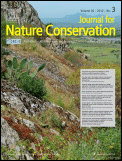
JOURNAL FOR NATURE CONSERVATION
Bridging Theory and Application in Landscape ConservationJOURNAL FOR NATURE CONSERVATION, published by Elsevier GmbH, serves as a pivotal platform for the dissemination of applied and theoretical research in the fields of ecology, nature, and landscape conservation. With an ISSN of 1617-1381 and an E-ISSN of 1618-1093, this esteemed journal has earned a notable reputation, ranking in the Q2 category for both Ecology and Nature and Landscape Conservation in 2023. It is indexed in Scopus with commendable rankings, including #67/211 in Environmental Science - Nature and Landscape Conservation, highlighting its significance within the academic community. The journal’s diverse scope captures the complexities of environmental challenges and offers insights beneficial to researchers, conservationists, and policymakers dedicated to preserving biodiversity and facilitating sustainable practices. Situated in Munich, Germany, the journal has continuously contributed valuable knowledge since its inception in 1991, making it an essential resource for those committed to advancing conservation efforts on a global scale.

Conservation Science and Practice
Innovating pathways to sustainable ecological practices.Conservation Science and Practice, published by WILEY, is a leading open access journal dedicated to advancing research and practice within the fields of ecology, environmental science, and conservation. Since its inception in 2019, this prestigious journal has quickly established itself as a vital resource for scholars and practitioners alike, holding impressive Quartile rankings in Ecology (Q1), Environmental Science (miscellaneous) (Q1), Global and Planetary Change (Q2), and Nature and Landscape Conservation (Q1) as of 2023. With a strong commitment to disseminating high-quality, peer-reviewed research, it serves as a platform for innovative solutions to the complex challenges faced in conservation today. The journal is accessible to a global audience, promoting the dissemination of critical findings that inform policy and practice in diverse settings. Researchers, professionals, and students looking to stay at the forefront of conservation science will find invaluable insights and developments within its pages. Join the conversation in shaping sustainable futures through cutting-edge research in Conservation Science and Practice.
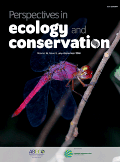
Perspectives in Ecology and Conservation
Elevating the discourse on ecology and sustainable practices.Perspectives in Ecology and Conservation, published by Elsevier Science Ltd, is a leading academic journal dedicated to advancing the fields of ecology, conservation, and environmental management. With a Q1 ranking in multiple categories, including Ecology, Management, Monitoring, Policy and Law, and Nature and Landscape Conservation, this journal boasts an impressive standing among its peers, making it essential reading for researchers and professionals. Since its inception in 2017 and running through 2024, it aims to provide innovative perspectives and critical analyses that enhance our understanding and practices in conservation science. The journal is accessible through open access options, facilitating broader dissemination of knowledge. Its commitment to addressing contemporary ecological challenges reinforces its importance in the academic community, promoting sustainable practices and informed policy-making in the face of urgent environmental issues.
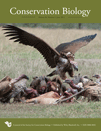
CONSERVATION BIOLOGY
Pioneering research in biodiversity and conservation.CONSERVATION BIOLOGY, published by Wiley, is a leading journal in the field of ecology and conservation, with a focus on disseminating high-quality research that addresses pressing environmental challenges. With a strong impact factor and categorized in the top quartile (Q1) across various relevant fields including Ecology, Evolution, Behavior and Systematics, and Nature and Landscape Conservation, the journal plays a pivotal role in advancing the scientific understanding of biodiversity and conservation practices. Since its establishment in 1987, CONSERVATION BIOLOGY has provided a vital platform for researchers, professionals, and students to share innovative findings and facilitate discussions surrounding ecological sustainability and conservation strategies. Although it is not an open-access publication, it ensures that a wide range of significant research is accessible to the global scientific community. The journal’s rigorous peer-review process and reputation for excellence make it an essential resource for anyone involved in the study of ecology and conservation.
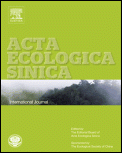
Acta Ecologica Sinica
Empowering scholars to shape the future of ecological science.Acta Ecologica Sinica, published by Elsevier, is a prominent journal in the field of ecology, with a strong focus on fostering understanding in ecological principles and their applications. Established in China, this journal holds an impressive Q2 categorization in both Ecology and Ecology, Evolution, Behavior and Systematics as of 2023, positioning it within the top tier of ecological research. With its Scopus rankings placing it in the 81st and 78th percentiles in relevant ecological domains, it serves as a vital platform for researchers and practitioners to disseminate findings that promote ecological sustainability. Although it operates under a traditional access model, its significant impact is underscored by its systematic convergence of key ecological inquiries across multiple years (2006-2008, 2014, 2017-2023). By engaging with the latest empirical studies, theoretical advancements, and methodological innovations, Acta Ecologica Sinica is indispensable for scholars dedicated to advancing ecological knowledge and addressing environmental challenges.
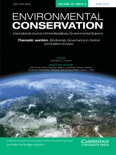
ENVIRONMENTAL CONSERVATION
Fostering Knowledge for a Greener TomorrowENVIRONMENTAL CONSERVATION, published by Cambridge University Press, is a premier academic journal dedicated to advancing the field of environmental science and conservation. Since its inception in 1974, this journal has established a robust reputation, currently holding prestigious rankings in various categories including Q1 in Nature and Landscape Conservation and Q1 in Water Science and Technology, alongside notable Q2 rankings across several related fields. With its broad scope, ENVIRONMENTAL CONSERVATION covers critical topics in health, toxicology, pollution control, and environmental policy, making it an essential resource for researchers, professionals, and students aiming to address the pressing challenges of environmental sustainability. Despite not being an open-access journal, its impactful content, demonstrated by its significant positions in Scopus rankings, enhances scholarly discourse and informs policy worldwide. As we approach its 50th anniversary, this journal remains pivotal in fostering innovative research and promoting best practices in environmental stewardship.
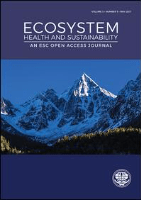
Ecosystem Health and Sustainability
Advancing ecological insights for a sustainable future.Ecosystem Health and Sustainability, published by the American Association for the Advancement of Science, is a premier journal in the field of ecological research and sustainability. Established as an Open Access journal since 2015, it has made significant strides in disseminating impactful research that addresses contemporary challenges in ecosystem health within a global context. With an impressive impact factor reflected in its consistent placement in the Q1 category across multiple fields—including Ecology, Evolution, Behavior and Systematics, as well as Management, Monitoring, Policy, and Law—this journal serves as a vital resource for researchers, professionals, and students alike. Based in the United Kingdom, the journal has shown notable performance in Scopus rankings, positioning itself within the top percentiles across various ecological specialties. As it continues its convergence through 2024, Ecosystem Health and Sustainability is committed to fostering the exchange of knowledge and promoting the integration of science and policy to advance sustainable practices globally.
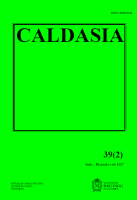
CALDASIA
Bridging Research and Innovation in Biological SciencesCALDASIA is a distinguished open-access journal dedicated to the field of Agricultural and Biological Sciences, published by INST CIENCIAS NATURALES, MUSEO HISTORIA NATURAL since its inception in 1981. Based in Colombia, this journal plays a pivotal role in disseminating scientific knowledge and fostering research collaboration across the globe. With a focus on diverse subjects within the biological sciences, CALDASIA aims to bridge gaps in research and support scholars, professionals, and students in advancing their work. With a 2023 Scopus Ranking of #132 out of 221 in its category, representing a 40th percentile ranking, it holds a solid position in the academic community, particularly recognized for its contributions to miscellaneous areas within agricultural and biological sciences. The journal remains committed to enhancing accessibility, as evidenced by its open-access policy since 2001, thereby ensuring that research findings reach a wider audience without barriers. For those returning to this vibrant field, CALDASIA serves as an essential resource for contemporary findings and discussions that shape environmental and biological scholarship.

Ecosistemas
Fostering biodiversity insights and ecological innovation.Ecosistemas is a prominent Open Access journal published by the ASOCIACION ESPANOLA ECOLOGIA TERRESTRE, specializing in the field of ecology. Since its inception in 2001, it has dedicated itself to advancing ecological knowledge and research, fostering an inclusive platform for the dissemination of cutting-edge studies that span ecological interactions, sustainability, and biodiversity. The journal, based in Spain, has established its reputation with notable rankings such as Q3 in the field of Ecology and Q4 in Ecology, Evolution, Behavior, and Systematics, reflecting its commitment to quality research. With a Scopus Ranks position placing it in the 40th and 37th percentiles for its categories, Ecosistemas is integral to the academic community, serving researchers, professionals, and students alike. It provides a vital resource for those seeking to understand ecological dynamics and environmental challenges, facilitating open access to important findings and discussions that shape the future of our ecosystems.